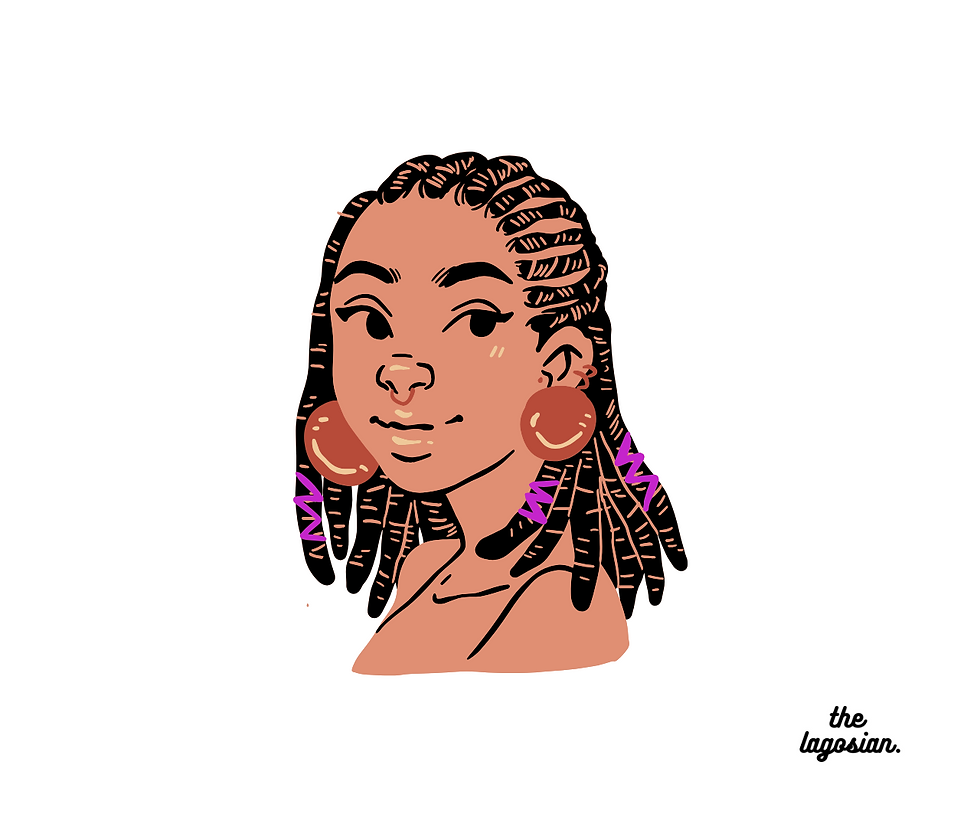- lolade Alaka

- May 8, 2021
- 6 min read
Updated: Nov 14, 2024
Isha was Bichara’s nanny, but her husband liked to refer to her as her secretary. She was a multilingual nurse with special administrative skills—rich people and their strange needs. She was one of those rich people now, she had to remind herself. Although, it was all Rahman’s money. Rahman and his formidable family.
“I’m so tired, and my legs…” She leaned against a tall polished stool with a large china urn on top, in the back lobby of her home. The plain-faced woman, about a decade older than her, walked straight toward Bichara, and tugged her forward with her hand were John’s was, toward the main hall. A maid passed by and the secretary ordered a basin of warm water as she led her madam to a private sitting room. “I think I should go to bed,” Bichara said in protest. Isha was great at French too. Part of her job was to teach her her husband's languages.
“You need to sit first, Mrs. Bello,” Isha said, leading her to one large armchair, and helping her onto it. “In an hour, you can lay down, and then you sleep.” She couldn’t argue with that order.
Constant exhaustion was just one of the symptoms she’d been suffering since the beginning of her second trimester. Her morning sickness never stopped, it seemed to be getting worse. She was bloating, and self-conscious about being naked in front of her husband. Worse still, the life in her tummy was extra active, and at all times of the day. It never slept. Was this a preview of what was to be expected when it came into the world? It was going to be a big baby, that much was obvious.

She didn’t know when she slept off after Isha carried the basin of tepid water back to the kitchen following a long soak, but as she opened her eyes, she knew she’d been sleeping for a long time.
She sensed a presence behind her and turned.
“Kun farka. Did you sleep well?” Rahman was standing at the arched doorway, his voice quiet. She tried to stifle a yawn but didn’t succeed. “I told them not to wake you.” She stretched out a bit, glancing away from him, surprised he was home. His work schedule was very irregular, and when he was home, she wasn’t sure what mood he was in.
“Yes…when did you…?” They always spoke French when it was just the two of them.
“About an hour ago,” he said, shoving his hands into his pants' pockets. He walked out of the airy room without further comment, and she rested back into the chair, letting out a deep calming breath, closing her eyes.
She felt the baby move and remembered a time when she was excited to feel its kick. Now, she was just tired and desperate for a restful sleep at night. She stood to her feet wondering if Rahman would want to feel their baby’s movement. She walked through the same path he’d just taken, up to their rooms. She found him sitting on the bed, his trusty smart phone in hand. He’d already taken off most of his clothes, left with his briefs on.
“The baby just kicked,” she mumbled just loud enough to carry to his side of the room, as she walked in through the archway.
“Good,” he grunted out in English, not shifting his attention even for a second from his phone. “That's good,” he muttered in Hausa, absentminded. He looked strained as he pressed away on his mobile’s touch screen, all but ignoring her.
She sighed, walked in fully, making a bee line for their bathroom.
She would ask about his work, if the company was doing well, but she’d been rebuffed on so many occasions for her to get the message—things were rocky on that front, and he was touchy about it. He was so obsessed with maintaining his father’s legacy, even building a greater one for himself, and for some reason, he’d been receiving a lot more opposition to his success than he’d anticipated. Even she was surprised at how much fire he was under from all sides. She didn’t know enough about the business world, but she was sure there was some kind of vendetta against him, a backlash of some dealings his father was involved in before he died. She didn’t know for sure because Rahman never talked about it to her. She’d had to get most of her information off the internet, it was embarrassing.
She returned after a long warm bath, to find him in the same position she left him several minutes ago. This time, on a call—a loud conversation in sharp Hausa. She couldn’t understand anything he was saying, more because he was talking so fast she found it hard to pick the words out than anything else. He was always so tense and involved, she wished she knew some way of relieving his stress when he was here at least. He didn’t give her any opportunities…and frankly, she was scared of him when he was that way. She didn’t know him as much as she wished she did.
Rahman Bello, at thirty-eight, was at the helm of affairs of the RuBel Conglomerate created by his cattle herder grandfather, and expanded by his industrialist father whose unexpected death two years ago left Rahman in control of his 61% of the company. Now, he struggled to manage a strange friction with the Rufai family—the second half of the partnership—headed by his father’s childhood friend. Aliu Bello had called Muhammed Rufai into the business when he needed extra resources to expand beyond West Africa. Muhammed's son, Ahmad, bore a deep personal grudge with Rahman and had decided to take it out on the company at its peak, and Rahman had a feeling Muhammed was more involved in his son’s actions than he let on.
Rahman's struggles were beyond that though; the stocks were responding negatively to the uncertainty of a shift in company leadership to an inheritor rather than the next in corporate hierarchy. Investors were dancing to the tune of the stocks of course, and everything seemed to be on standstill. Except for the bills. Those were running into hundreds of millions of naira by the day, cutting deep into company coffers.
Running a company was hard work, running a multinational was a whole different matter. He knew that, everyone knew that. But not his family. His step mother took her monthly allowances, and then some, caring less how it was coming in, her children were no better. RuBel was not in trouble, far from it, but he had to get these first few years right if he was to keep it that way. The market, investors, shareholders, had to be convinced he knew what he was doing. He had to make the right commercial decisions at every turn, he couldn’t make any mistakes. They had to respect him, fear him, and he was going to make that happen. His father had taught him that.
He sat there now, on his bed, talking with his men at the field, the men in charge of the shipping ports in Lagos, discussing last quarter’s figures which had dropped since the quarter before, marginally, but even so, he wanted to know why. He wanted to discuss cargo details now, so he could have his assistant rearrange his agenda for tomorrow so he could have a video conference with the financial directors.
He almost forgot his wife was there in their room with him until he felt the bed move under him, felt her struggle to get under the covers, his beautiful, pliant, foreign wife. He turned around to find her back to him and the comforter covering her entire body, and sighed. She was always tired these days. If only he had the luxury to sleep whenever he wanted. He went back to his phone, sending emails.
Minutes later, he stood to call for his dinner to be brought up, and stepped into the bathroom for a long, deserved shower.
So you've met Rahman. How intimidating is he, or is Bichara overreacting? What do you think of their relationship? Is Rahman being unnecessarily distant considering all he has to deal with? Should Bichara be more vocal? Tell us in the comments below. We'd love to talk about it.
Chapter 3 will be posted next Saturday...






